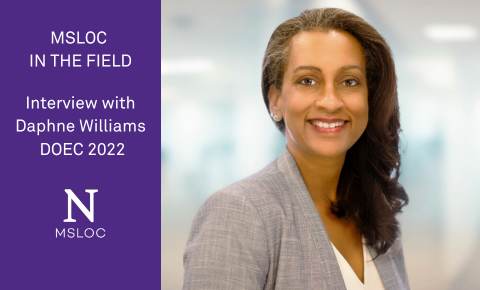DOEC in the Field: Daphne Williams on Navigating Organizational Challenges with People-centered Innovative Solutions
 Our latest MSLOC community member profile with alum Daphne Williams is based on a live interview conversation conducted via Zoom
Our latest MSLOC community member profile with alum Daphne Williams is based on a live interview conversation conducted via Zoom
Please introduce yourself and share a little about your professional background before and after completing the Designing for Organizational Effectiveness Certificate (DOEC).
My background is very diverse. It spans advertising, education, sales, marketing, and non-profit work. When I joined DOEC, I was the operations leader of a community-based organization in Chicago. It was with this organization when the pandemic hit and I found myself in the throes of rethinking many organizational processes.
Because of my background in advertising, I was naturally inclined towards design thinking. I wondered how I could apply this approach to organizational contexts, especially amid the chaos of the pandemic. My goal was to find better, more strategic ways to conduct organizational work, with an emphasis on experimentation and testing. After researching various programs, I discovered Northwestern's Designing for Organizational Effectiveness Certificate (DOEC), which seemed like a perfect fit. Completing the program significantly enhanced my ability to implement design thinking in organizational settings, allowing me to drive more effective and innovative solutions. Currently, I am an Organizational Change Management Lead at a boutique IT company in Chicago where I am working on a health and human services enterprise technology project.
How has the Designing for Organizational Effectiveness Certificate (DOEC) influenced your career trajectory?
DOEC equipped me with tools that are integral to my day-to-day work, allowing me to approach challenges with a strategic and experimental mindset. The program provided a fresh perspective on organizational frameworks and people dynamics, areas I had encountered in previous roles but never fully explored.
One of the most impactful learnings from DOEC was about focusing on outcomes versus outputs. This has helped me get leaders to think more about what they’d like to see from their teams. For instance, when planning the rollout of significant changes, I now consider the follow-up actions and how leaders and managers can facilitate meaningful conversations and activities with their teams after the change.
The knowledge I acquired through DOEC has helped me advise executive leaders on tailoring communication strategies to fit our unique organizational culture. Additionally, the program’s comprehensive curriculum, including readings on culture and organizational design, has enabled me to implement practical solutions for our client, such as creating networks for workforce support and designing interactive sessions to facilitate technology adoption.
Personally, I’ve adopted the practice of journaling my insights every week; this helps me with sense-making organizational dynamics and has enhanced my ability as a reflective practitioner. Overall, DOEC fortified my knowledge base and provided a safe space to analyze my reflections, problem-frame, and collaboratively design solutions with a people-centered approach. As a result, I now view my work with a different lens, question deeply, and design change initiatives that help clients achieve their desired outcomes.
How has being part of the community benefited you in terms of connections and/or collaborations?
Being part of the DOEC community has been incredibly beneficial in terms of connections and collaborations. The program has provided me with a network of like-minded individuals who are progressive in their thinking about organizational effectiveness and change. The community shares values about what organizations can become with the right leadership and guidance, which has been both powerful and inspiring. Being surrounded by a community committed to this work has made me feel less isolated, as we often serve as truth-tellers and guides in our respective organizations, a role that can sometimes be unpopular. Having a safe space to discuss challenges and exchange perspectives has been invaluable. For the first time, I feel like I’ve found my professional tribe.
Additionally, the openness and receptiveness of this community has fostered a supportive environment where setting up chats or coffee meetings to discuss ideas or challenges is always welcomed. This sense of belonging and mutual support has not only provided me with new insights but also reinforced the importance of a collaborative and inclusive organizational culture. In many ways, the MSLOC program models the type of organization we aspire to create, enhancing my ability to implement these principles in my professional work.
What advice would you give to current or potential students pursuing the Designing for Organizational Effectiveness Certificate?
Enter the program with a curious mindset is crucial. Embrace the community of curious learners, where no question is dismissed. Actively engage in discourse with peers and instructors, foster a genuine desire to learn and grow. For those juggling work commitments, seize the chance to experiment with new concepts in your environment. Stay open-minded and curious throughout the program, as even small experiments can yield valuable insights.